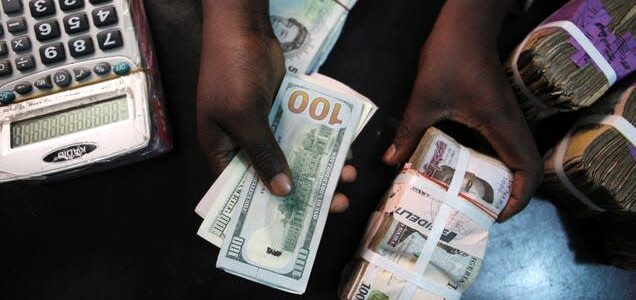
Nigeria’s naira closed trading at a record low of N848 per dollar on the official market yesterday, according to data from FMDQ, as dollar shortages persist.
That’s nine percent lower than the closing rate of N778/$ on Monday, representing the biggest single day decline this month.

The currency also fell to a low of N1,050 per dollar on the parallel market amid strong demand for dollars.
One of the traders said on Tuesday that individuals who want to travel for business, school, health and tourism are buying dollars from the street traders because they could not meet their demands from the official market.

Naira on Tuesday afternoon fell to an all-time low of N1,050 per dollar following strong demand for dollars at the parallel market, popularly called the black market.
This represents a marginal depreciation of 0.09 per cent (N1) compared to N1,049 traded in the morning.
The local currency remained steady at N1,049 per dollar since Friday at the parallel market, also known as the black market.
One of the traders said on Tuesday that individuals who want to travel for business, school, health and tourism are buying dollars from the street traders because they could not meet their demands from the official market.
Nigeria’s currency weakened against the dollar on Monday as foreign exchange (FX) market liquidity declined by 18.72 percent at the official market.
The FX market closed on Monday with the dollar being quoted at N778.80 as against N764.86 quoted on Friday at the Investors’ and Exporters’ (I&E) forex window, Nigeria’s official foreign exchange market.
According to the data obtained from the FMDQ, the daily foreign exchange market turnover, which reflects the level of liquidity or transaction in the market, declined by 18.72 to $43.09 billion on Monday from $53.02 billion recorded on Friday.
As part of its responsibility to ensure price stability, the Central Bank of Nigeria (CBN) said it will boost liquidity in the Nigerian foreign exchange market by interventions from time to time.
“As market liquidity improves, these CBN interventions will gradually decrease”, the CBN said.
Nigeria’s Central Bank said it will continue to promote orderliness and professional conduct by all participants in the Nigerian foreign exchange market to ensure market forces determine exchange rates on a Willing Buyer – Willing Seller principle.
The CBN reiterates that the prevailing FX rates should be referenced from platforms such as the CBN website, FMDQ, and other recognised or appointed trading systems to promote price discovery, transparency, and credibility in the FX rates.
Credit: Leadership
